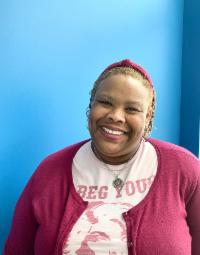Meet Kimberly Jones, high school teacher from Chapel Hill, NC who participated in TOLI’s 2022 Seminar on Holocaust and Human Rights Education.
When Kimberly Jones, a high school English teacher from Chapel Hill, North Carolina, first taught the Holocaust seventeen years ago, she probably didn’t anticipate it would become a vital part of her teaching career. Today, it is.
“I devote nine weeks — a full academic quarter — to the Holocaust,” she said.
What drew her to the literature and history of the Holocaust were books such as Night and The World Must Know, which resonated strongly with her — and with her diverse student population. “Through these studies, my students not only come to a greater understanding of the historical realities of this dark time in human history, but they also see the connections to current crises and human rights atrocities and are moved to act, inform others, and raise awareness in an effort to end them.”
Last summer, Kimberly participated in the 10-day TOLI seminar in New York City for Holocaust educators from around the country. “The TOLI program was a transformative experience for me as a person and an educator. It was validating, empowering and encouraging.”
She sees the Holocaust as a unique event, but also one that sheds light on other historical and contemporary civil rights issues. “I am able to study the Holocaust and also help my students see the patterns of oppression, the foundations of oppression.”
As a person of color teaching the Holocaust, Kimberly views her background as providing an important perspective for her students. “The lessons of the Holocaust are universal,” she says. “You don’t have to be Jewish to understand. You don’t have to be a victim of oppression to understand.”
And for Kimberly, the forces that led to the Holocaust have relevance today: “We have to talk about the role that racism played in it. How, in good conscience, can we talk about the ramifications of this horrific event and ignore the manifestations of racism today? If we can understand the past and make connections to the present and make it better for the future, that’s the point of what we do as educators.”
Kimberly grew up in a rural community in North Carolina. She was shocked to discover that her father, a huge inspiration in her life, was functionally illiterate, despite having a high school diploma and management job. It’s what led her into a career in teaching. “I am in a profession that allows me to give students all the tools they need to build healthy, happy, principled, productive futures.”
In listening to Kimberly, one can’t help being touched by her warmth and enthusiasm. It is, no doubt, what keeps her committed to her work and having an impact on hundreds of students. When asked the secret to impactful teaching, she responds:
“It’s about the energy you bring as an educator.”
Kimberly is one of 5,000 teachers in the US and Europe who have participated in TOLI programs, and are making an impact by bringing lessons of the Holocaust to their schools and communities.

